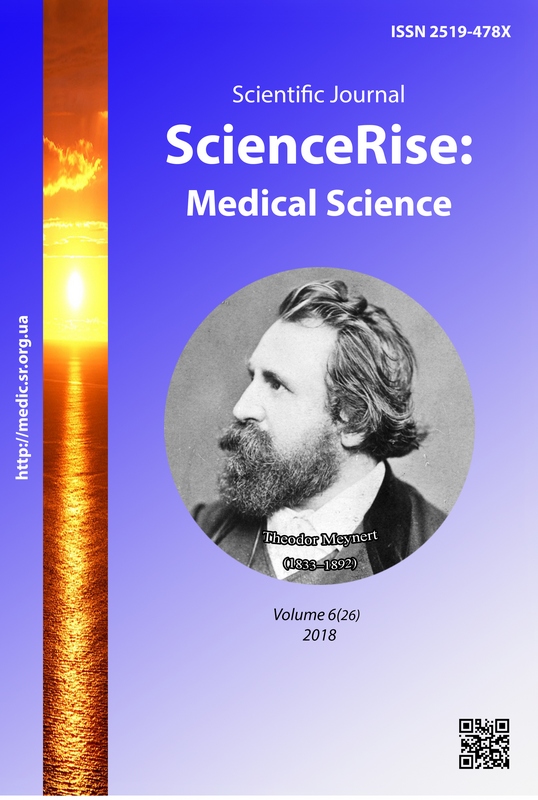Methodology and efficiency of the psychotherapeutic correction system of adaptation disorders of students
DOI:
https://doi.org/10.15587/2519-4798.2018.143068Keywords:
medical students, adaptation disorders, anxiety, depression, coping strategies, psychoeducation, psychotherapyAbstract
The aim: to develop a system of psychotherapeutic correction of adaptation disorders of medical university students.
Materials and methods of research: to achieve the set aim with observance of the principles of bioethics and deontology, a comprehensive clinico-anamnestic, clinico-psychopathological and psycho-diagnostic examination of 412 students of both sexes, Kharkov National Medical University (KhNMU) at an average age of 18.0±2.0, 52.2 % of the surveyed (215 students) were residents of eastern Ukraine, 21.1 % (87 students) – residents of the Lugansk and Donetsk regions who entered the KhNMU at the beginning of the ATO and 26.7 % (110 students) internally displaced persons from the ATO zone.
Research methods: clinical-psychopathological, psycho-diagnostic, statistical.
Results. As the results of the study showed, the students-migrants from the ATO zone show a higher level of adaptation disorders, compared to students in eastern Ukraine and residents of the Lugansk and Donetsk regions who entered the KhNMU for education at the beginning of the ATO. We developed a system of psychotherapeutic correction of disadaptation conditions in students of the medical university which was aimed at overcoming adaptation disorders and potentiating adaptive personality mechanisms of students by revealing the pathogenetic nature of the conflict, determining the start of disadaptive reactions, processing the pathological behavior stereotype, forming a tendency to use constructive forms of coping, normalizing the system of emotional-volitional reaction, increasing self-esteem, activation of protective psychological mechanisms skill formation self psychological state. As shown by the results of dynamic observation against the background of the proposed system of psychotherapeutic correction of disadaptation states, the level of adaptation of students has significantly increased, anxiously depressive symptoms have been reduced, and the level of neuropsychic tension has become lowered. The obtained results of the research testified to the positive influence of psychotherapy on the optimization of the coping strategy of the problem-solving behavior of medical students.
Conclusions. A system of psychotherapeutic correction of medical students' disadaptation conditions has been developed. This includes the use of rational psychotherapy (Dubois P., 1912), individual cognitive behavioral therapy (Beck A. T., 2006), autogenic training – psychotonic variant by A. M. Shogam, K. I. Mirovsky (1963) and art therapy using the techniques of "Drawing Yourself", "The Star of Senses". Sense-forming element of the developed system of psychotherapy is psychoeducation using information modules and training the formation of communicative skills and skills in solving problems of interpersonal interaction. Under the influence of psychotherapeutic correction of adaptation disorders, rapid reduction of anxious and depressive symptoms, normalization of emotional state, optimization of coping strategy of problem-solving behavior with predominance of coping of problem-oriented problem
References
- Kiosieva, O. V. (2016). Psykhopatolohycheskaia kharakterystyka emotsyonalnoi sferi u studentov mladshykh kursov. Ukrainskyi visnyk psykhonevrolohii, 24 (1 (86)), 60–63.
- Malakhov, P. S., Asieieva, Yu. O., Kharitonova, A. S. (2016). Problemnist adaptatsii studentiv-medykiv. Medychna psykholohiia, 2, 3–5.
- Chaban, O. S., Khaustova, O. O., Trachuk, L. Ye. (2016). Shliakhy pidvyshchennia efektyvnosti navchannia studentiv za spetsialnistiu «Medychna psykholohiia». Medychna psykholohiia, 11 (1), 3–8.
- Kozhyna, H. M., Markova, M. V., Grinevich, E. G., Zelens'ka, K. O. (2011). K probleme adaptatsyonnoho syndroma studentov mladshykh kursov VUZov III–IV urovnei akkredytatsyy. Arkhiv psykhitrii, 17 (4 (67)), 32–35.
- Kovalenko, M. V. (2014). Strukturnyi analiz perfektsionizmu ustudentiv vyshchykh navchalnykh medychnykh zakladiv. Ukrainskyi visnyk psykhonevrolohii, 22 (3 (80)), 65–68.
- Zelens'ka, K. O. (2011). Sravnitel'nyy analiz osobennostey adaptatsii k uchebnoy deyatel'nosti studentov pervokursnikov. Tavricheskiy zhurnal psikhiatrii, 15 (2 (52)), 22.
- Pshuk, N. H., Slobodianiuk, D. P. (2015). Rol psykhosotsialnykh chynnykiv v genezi sotsialnoi dezadaptatsii u studentskoi molodi. Ukrainskyi visnyk psykhonevrolohii, 23 (2 (83)), 86–91.
- Leshchyna, I. V. (2011). Skryninhova diahnostyka nepsykhotychnykh psykhichnykh rozladiv u studentiv-medykiv. Visnyk problem biolohii i medytsyny, 1 (2), 131–135.
- Korniienko, O. V. (2015). Indyvidualno-typolohichnyi (introvertovanyi) ta faktornyi analizy psykhosomatychnoho zdorovia studentok-divchat Kyivskoho natsionalnoho universtytetu imeni Tarasa Shevchenka. Humanitarnyi visnyk DVNZ "Pereiaslav-Khmelnytskyi derzhavnyi pedahohichnyi universytet imeni Hryhoriia Skovorody", 35, 144–151.
- Iureva, L. N. (2017). Krizisi professyonalnoi deiatelnosty vracha i puti ikh preodolenyia. Zdorovia Ukrainy, 2 (41), 23–24.
- Aimedov, K. V., Strelbytska, S. M. (2014). Profesiina mobilnist maibutnikh fakhivtsiv u protsesi navchannia u VNZ: kompetentnisnyi pidkhid. Naukovo-metodychnyi zhurnal «Naukovi pratsi». Seriia: pedahohika, 251 (239), 49–52.
- Herasymenko, L. O. (2018). Psykhosotsialna dezadaptatsiia (suchasni kontseptualni .modeli). Ukrainskyi visnyk psykhonevrolohii, 26 (1 (94)), 62–65.
- V`iun, V. V. (2017). Pryntsypy ta alhorytmy psykhoterapevtychnoi korektsii rozladiv adaptatsii u likariv interniv. Ukrainskyi visnyk psykhonevrolohii, 25 (3 (92)), 26–28.
Downloads
Published
How to Cite
Issue
Section
License
Copyright (c) 2018 Maksim Khaustov

This work is licensed under a Creative Commons Attribution 4.0 International License.
Our journal abides by the Creative Commons CC BY copyright rights and permissions for open access journals.
Authors, who are published in this journal, agree to the following conditions:
1. The authors reserve the right to authorship of the work and pass the first publication right of this work to the journal under the terms of a Creative Commons CC BY, which allows others to freely distribute the published research with the obligatory reference to the authors of the original work and the first publication of the work in this journal.
2. The authors have the right to conclude separate supplement agreements that relate to non-exclusive work distribution in the form in which it has been published by the journal (for example, to upload the work to the online storage of the journal or publish it as part of a monograph), provided that the reference to the first publication of the work in this journal is included.









